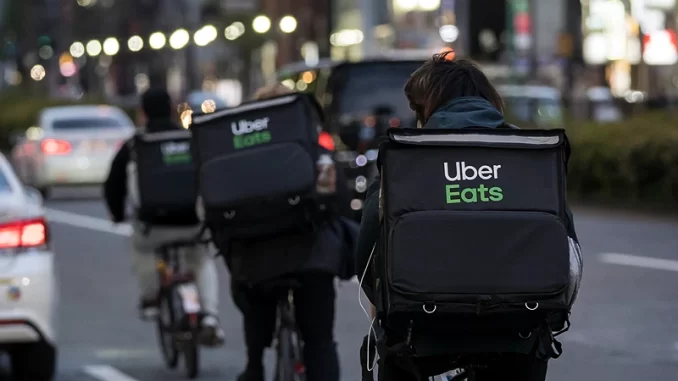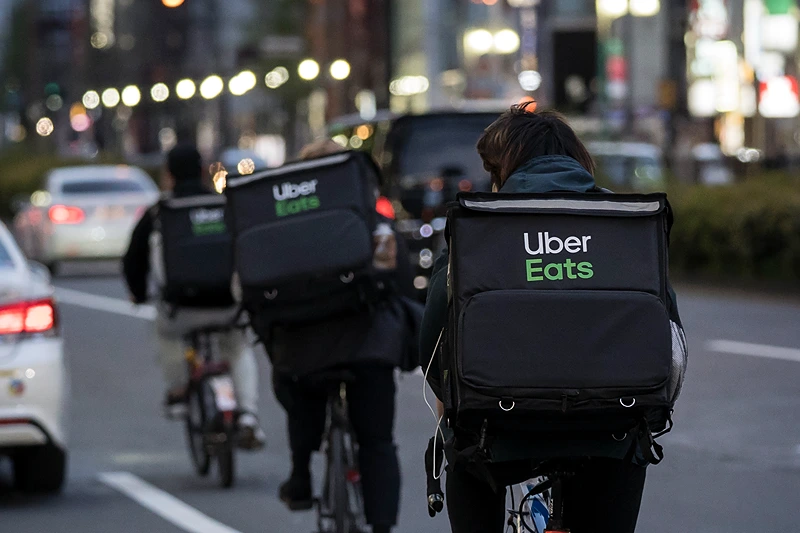

OAN’s Brooke Mallory
11:53 AM – Thursday, July 6, 2023
Grubhub, Uber Eats, and Doordash have filed lawsuits against New York City in an attempt to prevent the city’s $17-an-hour minimum wage ordinance for food delivery employees from taking effect next week.
Advertisement
The three tech giants are among those warning that the new minimum wage, up from an average of $7.09 per hour already given to delivery drivers, could result in higher consumer bills and the demise of food enterprises.
Their cases represent an increase in conflicts between companies and the local government regarding how the industry should be governed.
The new regulation, which reportedly goes into effect on July 12th, will increase the average wages of the Big Apple’s 60,000 app-based delivery drivers over the following two years.
New York Democrat Mayor Eric Adams praised the new ordinance for providing “greater economic stability” for gig economy employees while still preserving the city’s “legendary restaurant industry.”
However, delivery businesses have said that the rule is based on a misunderstanding of how the gig economy works, and they warn that costs would affect both restaurants and customers’ pockets.
On Thursday, DoorDash Inc and Grubhub Inc filed a combined petition in the Supreme Court of New York contesting the statute, while Uber Technologies Inc and Relay Delivery Inc filed separate petitions.
Relay, also located in New York, claims the regulation would force it out of business unless it hikes restaurant costs.
The new minimum wage for app-based couriers will be $17.96 per hour beginning next week, with a projected increase to $19.96 by April 2025, according to city officials.
This does not include tips and will be adjusted yearly for inflation.
Companies could alternatively choose to pay workers about 50 cents each minute spent on a journey, which amounts to a greater compensation than the $17.96 hourly rate.
Adams still doubled down and confidently claimed that the new Department of Consumer and Worker Protection law will greatly benefit salaries and eateries.
“Our delivery workers have consistently delivered for us – now, we are delivering for them,” Adams said while announcing the new law last month.
“This new minimum pay rate, up by almost $13.00 an hour, will guarantee these workers and their families can earn a living, access greater economic stability, and help keep our city’s legendary restaurant industry thriving,” he continued. “People must live off of a base salary and I encourage everyone who’s listening to this, don’t forget to tip.”
Meanwhile, labor organizations around the country elsewhere are also urging higher wages and better working conditions for gig workers, who frequently face inconsistent incomes and fewer safeguards than other jobs.
According to Ligia Guallpa, executive director of the Brooklyn-based Worker’s Justice Project, the new ordinance is a “historic moment for New York City.”
“This rule will set the pay floor for all the essential deliveristas who work tirelessly – whether through a pandemic, a snowstorm or wildfire smoke – and who have been denied a living wage for far too long,” Gullapa said. “While there’s still work to do, a minimum pay rate for food delivery workers will transform the lives of thousands of families across the city and deliver long overdue justice for deliveristas.”
Stay informed! Receive breaking news blasts directly to your inbox for free. Subscribe here. https://www.oann.com/alerts

